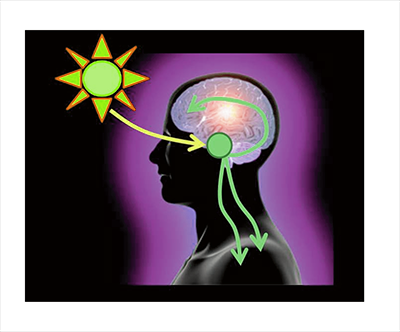We have evolved an internal biological clock, called the circadian rhythm, to help our bodies adapt to the daily cycle of day and night (light and dark) as the Earth rotates every 24 hours. The term “circadian” comes from the Latin words for ‘about’ (circa) and ‘a day’ (diem).
Circadian Rhythm Basics
Our cells contain tiny molecular clocks that measure out a 24-hour circadian rhythm. Circadian rhythms are controlled by “clock genes”.
Clock genes have been found in organisms ranging from people to mice, fish, flies, plants, molds, and even single-celled bacteria.
Clock genes code for clock proteins that rise and fall in rhythmic patterns, controlling various functions, including when we sleep and rest, and when we are awake and active. Circadian rhythms regulate hormone secretion (such as melatonin, growth hormone, testosterone), body temperature, heart activity, blood pressure, oxygen consumption, metabolism, levels of red blood cells, blood sugar, oxygen and carbon dioxide levels, and ions such as potassium and sodium.
 Our ‘master biological clock’ is housed in a small region of the brain’s hypothalamus, called the suprachiasmic nuclei (SCN). SCN neurons (nerve cells) acts as our central pacemaker, checking the cycles of light and dark outside, and then sending electrical signals to synchronize clocks in tissues and organs throughout the rest of the body. Ultimately, it is the SCN that regulates our daily sleep, hormone and metabolic cycles.
Our ‘master biological clock’ is housed in a small region of the brain’s hypothalamus, called the suprachiasmic nuclei (SCN). SCN neurons (nerve cells) acts as our central pacemaker, checking the cycles of light and dark outside, and then sending electrical signals to synchronize clocks in tissues and organs throughout the rest of the body. Ultimately, it is the SCN that regulates our daily sleep, hormone and metabolic cycles.
Here are some graphs of of circadian cycles for normal physiological and hormonal activity.
Circadian rhythms for health – physical and mental
Building healthy, strong circadian rhythms is essential for our general health. Disruption of circadian rhythms can lead to more oxidative damage and the steady accumulation of damaging free radicals, and as a consequence, worsen age related diseases including dementia. Disruption of circadian rhythms can be a risk factor for diseases as diverse as metabolic syndrome, cancer and psychological depression (reference). People who fall out of sync with their circadian cycles are more likely to suffer from diabetes, obesity, and heart disease.
Circadian rhythms with their associated hormonal cycles can explain how some of our daily activities are often at their most optimal at particular times of the day, as shown in the diagram below. Lots of factors come into play on any given day, but this is the general pattern.
Mental challenges are best tackled between 9-12 in the morning. Core body temperature appears to be a key determinant of cognitive performance (reference).
Strategies for building a more resilient circadian rhythm
Dr. Gerhauser (Dr ‘G’) gives some useful tips on how to build a more optimal circadian rhythm. Many of these are aimed at reducing the negative effects of artificial light on melatonin production. Melatonin is a critical circadian-controlled hormone secreted by the pineal gland, closely associated with sleep and wakefulness.
- Expose yourself to bright light on a daily basis – particularly in the early morning.
Sunlight is the most powerful but any light will work. It is the blue-white light spectrum that is most effective. “Getting out in the morning sunshine has the most powerful effect in setting the optimal rhythm for our bodies“. - Avoid bright light at night. “Studies show that nighttime light exposure can lead to sleep problems as well as immune system problems. This is in both humans and animals.“
- Incorporate physical activity into your day.
- Eat your meals during the light hours of the day, having your last meal in early evening. Avoid heavy meals late in the evening.
- Install the f.lux app for your computer (it’s free!). This adjusts your computer screen monitor to become more ‘warm’ at night, reducing the white-blue light level. Here is the link for the download. I have this app installed on my computer.
- Wake up at the same time every day – even the weekends.
- Have a consistent bedtime & bedtime routine.
- Avoid stimulating activities or substances in the evening.
- Have a dark room with no light to sleep in.
- Practice meditation or breathing for relaxation in the evening.
- Don’t use your mobile or tablet in bed. Use your bed primarily for sleep.
The timing of your meals & metabolism
Our metabolic functions, as controlled by the circadian clock, evolved to cycle in harmony with the Earth’s daily rhythms, to optimize processes such as energy use and storage. In doing so, we became adapted to eat during the daytime, and maladapted for eating at night. Opposing these rhythms, as many of us now do, may challenge our bodies’ normal cycles and set us up for disease.
Studies are now revealing that our food metabolism is primed by the circadian machinery written in our clock genes, and discord between the two can wreak havoc on our systems (reference).
One Harvard Medical School study looked at Spanish dieters and found the following:
The participants had signed up for a weight-loss program, and the investigators tracked their eating habits. Half of the participants ate their main meal earlier in the day, before 3 p.m., while the other half ate later. Both groups followed a similar diet, exercised about the same amount, slept the same number of hours, and even produced similar levels of hunger-related hormones. Yet the early eaters lost weight faster and by the end of the study had shed a greater percentage of their body weight than the late eaters
Research has shown that some of the ‘clock genes’ in the mammalian gastrointestinal tract are sensitive to when food is eaten. Clock proteins in the colon peak in abundance at dramatically different times during a 24-hour cycle, depending on whether eating is continuous through the day or restricted to daytime. If eating is mistimed, it can create an imbalance between the clock proteins regulating e.g. intestinal absorption, and this causes problems with energy balance (metabolic stress).
Taking a closer look at the genes whose expression can be impacted by mistimed eating, Dr. Satchin Panda has found impacts on glucose metabolism, fatty acid synthesis and breakdown, cholesterol production, and liver function. He argues that some proteins require a period of fasting to operate properly.
And it’s not just when you eat that can affect clock genes and circadian rhythm timing – it’s also what you eat. Insulin – that comes with high GI carbohydrate meals – has been shown to change the circadian clock— extra insulin induces drowsiness, too little causes wakefulness (article). In one study, Makoto Akashi of Yamaguchi University in Japan, gave mice insulin or withheld it. She found that insulin treatment caused a phase adjustment of the circadian clock of the mice.
Another study showed that a carbohydrate-based high-GI meal resulted in a significant shortening of the time it took to fall asleep in healthy sleepers compared with a low-GI meal and was most effective when consumed 4 h before bedtime (reference).
When and what should we eat?
The research suggests the following:
- Main meals should be eaten during the day, no later than early evening before dark. Don’t snack on fatty foods at night.
- Periods of fasting during the night, between meals is desirable.
- Eat a high carbohydrate (higher GI) meal in the evening, 4 hours before bedtime (reference).
- Eat a high protein breakfast. Protein helps produce dopamine which makes people feel more awake. Protein suppresses appetite for snacking during the morning. Testosterone increases muscle protein synthesis, and testosterone levels are highest in the morning.

